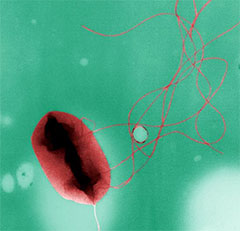
Shiga toxin-producing E. coli (STEC) is spread mainly through food contamination, causing illness that can be severe for some people.
STEC is part of the large E. coli group of bacteria (germs), most of which are harmless and form part of a healthy intestinal tract. These bacteria help digest food, produce vitamins, and protect us from harmful germs. However, some types of E. coli can make people sick, and STEC is one of these. The most commonly recognized strain of STEC is known as E. coli O157:H7.
How STEC Is Spread
STEC bacteria must be swallowed to cause infection. This can happen when these germs are present in food or drink that is not properly cooked or pasteurized. The germs can also spread from person to person if food is prepared for others without thoroughly washed hands. Spreading E. coli germs this way is more common in families and day care centers than in schools and restaurants.
Symptoms of STEC
Symptoms usually start 3-4 days after someone is infected, but can take longer to appear. Symptoms generally include:
- Diarrhea (sometimes bloody)
- Severe stomach cramps
- Vomiting
Groups Most Affected
Anyone can get STEC infections, but the ones most likely to develop serious symptoms include:
- Children younger than 5 years old
- Adults 65 years and older
- Individuals with weakened immune systems
How to Prevent STEC Infection
Practice basic food safety
- Keep your hands clean. Handwashing is one of the best ways to protect yourself and others from getting sick.
- Practice simple food safety at home. E. coli and other harmful germs can be on your kitchen surfaces and in your foods. To prevent illness, remember to clean, separate, cook and chill.
Do not drink unsafe water.
Having safe drinking water may be as simple as turning on the tap. But sometimes, extra steps are needed to make sure water is safe.
- When camping, hiking or traveling, always use safe water for drinking, cooking, brushing your teeth or other activities. Use one of these methods to treat or purify water.
- Don't swallow water when swimming or playing in lakes, ponds, streams, swimming pools and backyard pools. Learn more about healthy and safe swimming.
Drink pasteurized milk and juices.
- Pasteurized milk and juices have undergone a process to kill harmful germs, including E. coli. Look for the word "pasteurized" on the label when shopping for milk, dairy products and juices. If in doubt, don't buy it!
What to do if you think you have STEC
If you have symptoms of STEC, or think you may have been exposed:
- Contact your healthcare provider. If you have symptoms of STEC infection (e.g., diarrhea, especially if it's bloody, severe abdominal cramps, vomiting, or fever), it's important to see a healthcare professional as soon as possible. Your doctor may recommend a stool test.
- Stay hydrated by drinking plenty of fluids. Diarrhea and vomiting can lead to dehydration. Drink water, oral rehydration solutions, or clear broths to maintain hydration. Avoid caffeine and alcohol as these can dehydrate you further.
- Get plenty of rest. Rest is important while your body fights off the infection. Avoid strenuous activity to help your body recover.
- Do not take antibiotics unless prescribed by your doctor. Antibiotics are generally not recommended for STEC infections because they may increase the risk of complications, such as hemolytic uremic syndrome (HUS), a serious kidney condition.
- Watch for complications such as HUS (Hemolytic Uremic Syndrome). Symptoms of HUS can include decreased urine output, swelling, bruising or pale skin. If you notice any of these signs, seek medical attention immediately, as HUS requires urgent care.
Avoid Spreading Infection
- Stay home while you are sick: Stay away from work, school or other public places to prevent spreading the infection to others.
- Practice good hygiene: Wash your hands thoroughly with soap and water after using the bathroom and before handling food to prevent spreading the bacteria to others.
- Avoid preparing food for others until you are symptom-free, since the bacteria can be transmitted through contaminated food.
Follow your doctor's advice. If your doctor prescribes any specific treatments or interventions, be sure to follow their guidance closely. This may include medications for symptoms or advice on diet and hydration.


